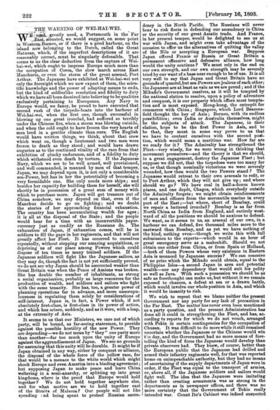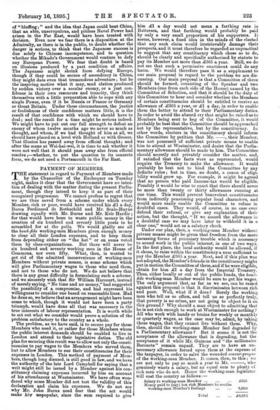THE WARNING OF liVELHAI-WEL
.+T
Ariv-t nod, greatly need, a Portsmouth in the Far „East, situated, we would suggest, on some point in Westeru.Borneo, or if there is a good harbour, on the island now belonging to the Dutch, called the Great Natunas, which, if the imperfect descriptions of it are reasonably correct, must be singularly defensible. That seems to us the clear deduction from the capture of Wei- hai-wei, which ought to impress Europe much more than the occupation of Corea, the slow march across East Manchuria, or even the storm of the great arsenal, Port Arthur. The Japanese have exhibited at Wei-hai-wei not only the foresight which we now expect of them, the scien- tific knowledge and the power of adapting means to ends, but the kind of soldierlike resolution and fidelity to duty which we have all been deceived into believing to be qualities exclusively pertaining to Europeans. Any Navy in Europe would, we fancy, be proud to have executed that second rush of the torpedo-boats into the harbour of Wei-hai-wei, when the first one though successful in blowing up one great ironclad, had suffered so terribly under the Chinese fire, when a storm was blowing outside, and when the cold ought to have frozen the very hearts of men bred in a gentler climate than ours. The English would have written things, we think, about that crew which went on, though a lieutenant and two men were frozen to death as they stood ; and would have drawn auguries as to the continued vitality of the race from that exhibition of plucky endurance, and of a fidelity to duty which withstood even death by torture. If the Japanese Navy, which we see to be well armed, well provisioned, and well commanded, is manned by men of that temper, Japan, we may depend upon it, is not only a considerable sea-Power, but has in her the potentiality of becoming a very formidable one. She only needs more ships ; and besides her capacity for building them for herself, she will shortly be in possession of a great sum of money with which to purchase more. Japan will get treasure out of China somehow, we may depend on that, even if the Manchus decide to go on fighting ; and we doubt the stories of her approaching financial exhaustion. The country has been accumulating wealth for ages ; it is all at the disposal of the State ; and the people would bear for a time with an inconvertible paper- currency just as readily as the Russians do. The exhaustion of Japan, if exhaustion comes, will be in soldiers to fill the gaps in her regiments, and that will not greatly affect her Fleet. It has occurred to ourselves repeatedly, without stopping our amazing acquisitions, or depriving us of our place among Powers which could dispose of ten times as many trained soldiers. If the Japanese soldiers will fight like the Japanese sailors, as they may do, though the fact is not yet sufficiently proved, we do not see why Japan should be accounted weaker than Great Britain was when the Peace of Amiens was broken. She has double the number of inhabitants, as strong a social organisation, probably as large resources for the production of wealth, and soldiers and sailors who fight with the same tenacity. She has, too, a greater power of planning operations far in advance, and more unscrupu- lousness in regulating them solely by considerations of self-interest. Japan is, in fact, a Power which, if not absolutely first-class, is first-class in its power of action, and which has arisen, suddenly, and as it were, with a leap, at the extremity of Asia.
It seems to us that our Ministers, we care not of which party, will be bound, as far-seeing statesmen, to provide against the possible hostility of the new Power. They are depending—we do not mean by " they " one party more than another—far too much upon the unity of Europe against the aggrandisement of Japan. We see no grounds for assuming that this unity will be durable. It might be if Japan obtained in any way, either by conquest or alliance, the disposal of the whole force of the yellow race, for that would be a menace to the white world which might shock Europe and even America into a binding agreement ; but supposing Japan to make peace and leave China weltering in a semi-anarchy, or splitting up into great kingdoms, where is the proof that Europe would hold together ? We do not hold together anywhere else, and for what motive are we to hold together east of the Straits of Malacca ? Our people will not like spending nd being spent to protect Russian ascen- dency in the North Pacific. The Russians will never bear to risk fleets in defending our ascendency in China or the security of our great Asiatic trade. And France, in her present temper, would be delighted to see us at war with Japan, and might even take advantage of the occasion to offer us the alternatives of quitting the valley of the Nile or accepting a European war. Suppose Japan offered France or Russia or Great Britain a permanent offensive and defensive alliance, how long would the unity continue ? We must rely in the end on our own strength, and our own strength may be severely tried by our want of a base near enough to be of use. It is all very well to say that Japan and Great Britain have no grounds of quarrel,but sea-Powers are jealous of each other; the Japanese are at least as vain as we are proud ; and if the Mikado's Government resolves, as it will be tempted by the national elation to resolve, upon a policy of adventure and conquest, it is our property which offers most tempta- tion and is most exposed. Hong-kong, the entrepOt for commerce with China ; Singapore, which Lord Beacons- field thought the key of Asia ; Borneo, with its endless possibilities; even India or Australia themselves, might be the subjects of attack. The Japanese, in their elation, hope to be the first Power in Asia, and to be that, they must in some way prove to us that we have to content ourselves with the second posi- tion, which would mean a maritime war. How far are we ready for it ? The Admiralty has strengthened the Fleet—very wisely, for we were wrong in thinking that movement premature—and the theory is that we should, in a great engagement, destroy the Japanese Fleet ; but suppose we did not, that the torpedoes were too many for us, or that though nominally victorious we were severely wounded, how then would the two Powers stand ? The Japanese would retreat to their own arsenals to refit, or to Port Arthur, which they will not give up ; and where should we go ? We have coal in half-a-dozen known places, and one depot, Chagos, which everybody outside the Admiralty forgets; we might obtain reinforcements of men and officers from the mercantile marine in every port of the East ;—but where, short of Bombay, could we repair a battered ironclad? Bombay is as far from North China as India from England, and entirely west- ward of all the positions we should be anxious to defend. We want, as it seems to us, an arsenal of our own, in a harbour we can defend, five thousand miles more to the eastward than Bombay, and as yet we have nothing of the kind, nothing even—though we write this with full submission to the experts—which would in an hour of great emergency serve as a makeshift. Should we not obtain one either from China, or from Spain or Holland, —both of them Powers whose very existence in Eastern Asia is menaced by Japanese success ? We can conceive of no prize which the Mikado could obtain, equal to the Philippine Isles—a second Japan in area and potential wealth—nor any dependency that would suit his polity so well as Java. With such a possession we should be as safe as forethought can make us, but without it we remain exposed to chances, a defeat at sea or a drawn battle, which would involve our whole position in Asia, and which it would be insanity to risk.
We wish to repeat that we blame neither the present Government nor any party for any lack of precaution in the Far East. The matter has never even been mentioned as a party question, and the present Administration has done all it could in strengthening the Fleet, and has, ac- cording to reports for which we do not vouch, arranged with Pekin in certain contingencies for the occupation of Chusan. It was difficult to do more while it still remained uncertain whether the Japanese or the Chinese would win Vie day, and the Government had no more means of fore- telling the kind of force the Japanese would develop than private observers bad. They knew, of course, better than the European public that the Japanese had drilled and armed their infantry regiments well, for that was reported home on unimpeachable authority, but they had no means of ascertaining if the supply departments of Japan were in order, if the Fleet was equal to the transport of armies, or, above all, if the Japanese soldiers and sailors would fight well. The idea that the Japanese were imitating rather than creating armaments was as strong in the departments as in newspaper offices, and there was no more certainty that the Government of Tokio really intended war. Count Ito's Cabinet was indeed suspected of " bluffing; " and the idea that Japan could beat China, that an able, unscrupulous, and pitiless Naval Power had arisen in the Far East, would have been treated with derision. Even now we fear there is a disposition at the Admiralty, as there is in the public, to doubt whether the danger is serious, to think that the Japanese success is due solely to Chinese incompetence, and to question whether the Mikado's Government would venture to defy any European Power. We fear that doubt is based on illusions produced by a past condition of affairs. The Japanese might shrink from defying Europe, though if they could be secure of ascendency in China, they might dare even that tremendous adventure ; but be the inspiring motive what it may, mad elation produced by sudden victory over a secular enemy, or a just con- fidence in their own resources and tenacity, they think themselves with a little preparation able to cope with any single Power, even if it be Russia or France or Germany or Great Britain. Under these circumstances, the justice or foolishness of their confidence matters little, it is the result of that confidence with which we should have to deal ; and the result for a time might be serious indeed. We might have to put out our full strength to defeat an enemy of whom twelve months ago we never so much as thought, and whom, if we had thought of him at all, we should have placed on a level with Holland or with Greece. That illusion has passed away from official thought ; and after the scene at Wei-hai-wei, it is time to ask whether it were not well that it should pass away also from official resolve ;—whether, to put the question in its concrete form, we'do not need a Portsmouth in the Far East.



































 Previous page
Previous page